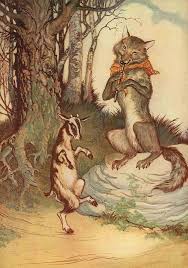Even LFS co-host Scott Wood admitted that Harte was something of a "strong draught". Despite all of this, the event (at The Bell in Whitechapel) was one of the fastest LFS events to sell out ever. Jeremy Harte is a folklorist and he's clearly one who is not scared to drill deep into his subject.
Neither is he one who wastes much time with preambles or introductions. Or even visuals (which might have helped). Within seconds he was reciting from the 1827 diary of a County Clare school mistress. A story about a girl returning from Mass and being touched by a 'black man' (1820s in Ireland, eh?). An event which led to her spending a fortnight in bed unable to move one of her legs.
Eventually she rubbed a herb on her thigh, said a few Hail Marys, and, soon, she was remarkably better. Perhaps she should have gone for the herb/Hail Mary combo a bit sooner and not wasted two weeks lying around in bed. Damaged legs, we were told, are a frequent result of fairy attacks. Especially attacks by 'faceless' fairies. Or black fairies. Although that part of the story seemed to have been forgotten by this point.
We'd only just started and I was struggling to keep up. Harte launched into tales of WB Yeats and Lady Gregory's articles about fairies (written in Connaught, I think, I was scribbling into my notebook hard and fast by now), relaying how most occultist fieldwork provides us with stories that resolutely do not have happy endings, and the underground and melancholy music of viols and lutes.
On a windy, stormy night a boy goes out for bread. He returns, dutifully, with said bread - but he only ever speaks again once in his entire life, a life he spends mostly in as asylum. That final sentence is reported to have been "I met awful people on the road"!
A lot of these Irish fairy stories take place in very prosaic, quite humdrum really, locations. Often horrors are visited upon people (females more often than not - gender, of course, raises its head in these tales) when they've just popped out in to the garden. Extensions to houses when new human babies arrive prove particularly prevalent, the idea being that the human world is encroaching on to the realm of the fairies and said fairies are displeased with this. Sometimes human children, daughters especially, are taken.
Fairies, Jeremy Harte informed us, have no inherent animosity. They act only in revenge - but they act in revenge often. We were regaled with a raft of awful stories about babies stolen from the fields (mostly in Suffolk and the Highlands of Scotland) while their mothers were out harvesting. Changelings were sometimes left in lieu of these abducted children.
The talk went deeper still - and further back. To the early twelfth century when many folk traditions combined and gelled together to create a fairy otherworld inspired by Old Norse and Greek mythology and folk traditions. Strip away the polytheism and the background narratives of these ideas, our speaker contested, and some of the minor characters become more important, take their place front of stage.
Those who made and served nectar at the foot of Mount Olympus, the outfitters for the Gods, and even witches were rarely, if ever, given names. By now I was losing the thread of the talk. I think Jeremy Harte was suggesting that, foklorically, fairies come from the same superstitions that gave us witches and polytheistic religions but I couldn't square that with his stories of a priest in Basle watching people singing and dancing in a field and an interview with a dead man in Dusseldorf.
Jeremy Harte was not that cynic. Warming to his theme, he went on to suggest that the articulation of our fears is, quite understandably, our attempt to control those fears. At this point I was back on track. I got where he was coming from. But soon he was pondering the narrative grasp of Cistercian monks, a theory that shingles can be cured by scraping vertebrae from a church bell, the role of Puck in Shakespeare's A Midsummer Night's Dream, and the former Hobgoblin pub chain!
From there it was on to the "manipulation of dwarf bridles" (?!?!?), St Augustine, the Legendarium, Lancelot, Persephone, bag ladies, and the scarcity of food in the underworld. It was all a bit academic, a touch learned for me. I'm a pop kinda guy and much as I was enjoying the talk I was struggling a bit. Making notes to maybe one day do some research on 'eskimo hospitality rituals', fairy doctors, cunning folk, and 'pin vomiting'!
All things I don't know about but feel I'd like to. Simon (who'd had a few jars to build his confidence at a conference earlier) piped up with a question about Northern European and Scandinavian folk traditions but I stayed schtum, jotting away and trying to make sense of Harte's digressions into the worlds of aliens and his theory that zombies lumber because they're occupied, and operated, by demons who control them. You know, a bit like The Numskulls in The Beezer!
By the end I was flummoxed, yet fascinated, by the talk. I'd loved the line "social death in a remote cottage" and would have liked to have heard more on Harte's theories regarding mental illness, 'magical talking', and the talking cure but I was also relieved to be able to take a breath.
Jeremy Harte had delivered his lecture in the style of a flamboyant elder Rik Mayall and if I'd lost sight of him after the first few chicanes I at least had plenty of inspiration to learn more about fairies and the traditions and superstitions that fuel belief in them. Another, this time qualified, successful evening from the London Fortean Society. 'Away with the fairies' hardly covers it!











No comments:
Post a Comment